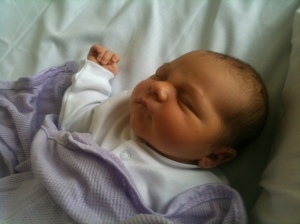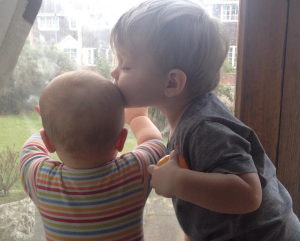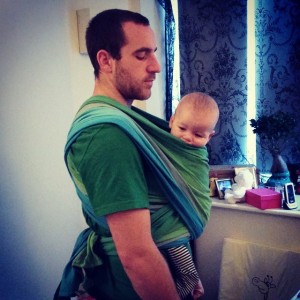Well, hello there! If you are a regular reader of this blog, you may know me already as the young lady who badgers folk to share their stories, their experiences and their knowledge with you all here at the PANDAS Guest Blog. I thought it would be natural to write about the PANDAS Conference on the following Monday, but here I am on Sunday evening without a post ready for tomorrow – eek…..
Most of you have probably already seen the photographs littering Facebook of speakers, people laughing (very loudly) and award winners, it was a great day and really well put together. I watched Sally Llewellyn (PANDAS Safeguarding Team) give two talks, one on Self Harm and Intrusive Thoughts and the other on Challenging Misconceptions, both were exceptional and we all took away a lot of invaluable information. I also watched a talk on Talking Therapies, which was so interesting that it over-ran into lunch and nobody complained!
Rachael, our beloved PANDAS Founder, gave a very moving talk which really challenged the way we speak to ourselves, it was horrifying to hear some of the quotes, particularly to hear mine (“I’m too selfish to be a good Mother”) among them. It was a real eye-opener.
Then came the most shocking part of all. I won a blooming prize. I went and won PANDAS Volunteer of the Year! 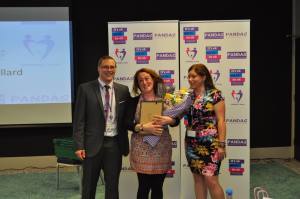
Stuart Dobson, Silly Cry Face and Rachael Jones
I was totally overwhelmed, I’m one of those people who never win anything. Or the type of person who kind of thinks they’re doing a good job until they see someone else doing it better so they give up. I was honoured, and a bit embarrassed that the photographer was taking a photo of my Silly Cry Face, but mostly just flat out amazed that I’d actually won something. (Read back to Rachael’s speech on how we talk to ourselves, ahem…) So, I thought that this week, I’d give you a little glimpse into my PANDAS Volunteering World so you can see what goes on behind the scenes 😀
My day usually begins with a hilarious message from our Online Co-Ordinator, Donna Swift. She’ll have probably been up since about 4.30am with her beautiful little girl so it kicks me straight into PANDAS gear. Still in bed, with maybe only one eye open, I’ll scan through my Google Alerts to see if there are any news stories relating to perinatal mental health, or PND, in my inbox. If there are, they’ll be posted up on the main facebook pages. I like that we stay up to date with everything going on out there and get very irritated if we miss something, so if you ever see something that we haven’t, get in touch!
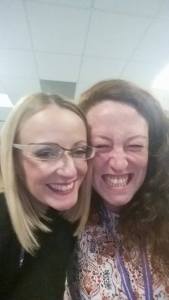
Donna “Queen of the North” Swift and myself
I’ll slope downstairs with my daughter, Violet, for an argument about cereal, or the telly, or toilet roll and when all is pacified, I’ll fire up the laptop ready to get my PANDAS hat on. I run the Facebook show on a Monday so along with relevant news articles I’ll have a look for other blog posts (my favourite blogger is brummymummy, hilarious…), things going on nationally such as Volunteers Week and Mental Health Awareness Week etc etc, and anything else that I think you’d like to see up on the page. I’m also on the admin team for PANDAS Closed Group so will make sure to keep up to date with approving posts and making sure you all know that we’re here for you.
The PANDAS Guest Blog will usually go up at about 9-10am. I always get really excited to hear the response the articles get as I’m always on the lookout for new writers and try to make sure we’re always bringing you the very best. I like to post the interview a little while later so that the article itself has settled down.
While this is going on, I’ll be flitting about across the PANDAS Facebook Groups doing little jobs for others like uploading pictures, scheduling interviews, designing certificates, all sorts really. I LOVE getting creative so really like designing things and love doing the videos for the PANDAS TV YouTube channel but also enjoy getting my geek on and working out how to solve problems with computer-y type jobs. I’m also working on a PANDAS Task Force to hopefully get some changes made within Primary Care settings to ensure we’re all getting the care we deserve.
If I get a minute, I’ll do some reading. I hunt down journals, articles, books, anything I can get my hands on. I’ve recently bought “Sad Dad – An Exploration of Postnatal Depression in Fathers” by Olivia Spencer. I’m really passionate at raising awareness of male PND, Dads deserve support as much as us Mums and I suspect that PND in men is reaching a similar frequency level as with women. I get quite excited if I find a television or radio programme that flags up mental health issues, so will spend half an hour or so watching/listening to see if it’s relevant to us here at PANDAS.
My daughter by this point will probably be going a little crazy and will have started climbing up my back shouting “PIGGY HEAD! PIGGY HEAD!” so I’ll take a break to do some play fighting or dancing and start thinking about lunch. If we head out into town, I’ll have my phone close to hand in case there’s somebody who needs to talk, or needs me to do anything. If it’s quiet in the afternoon, I’ll do some emailing/harassing 🙂 I’m setting up a PANDAS Support Group in Rugby at the moment so am emailing local parent groups and mental health campaigners, a whole range of different people, to try and get some publicity and also to seek out people with common interests and goals.
I’m also studying a Mental Health course, so if things are really, really quiet, and Violet is asleep, I’ll crack on and get ahead on that. But to be honest, that really doesn’t happen very often.
In the evenings, with Homeland on in the background, I’ll sit and write up blog posts or interviews, or may even have some telephone interviews with prospective PANDAS volunteers. There’ll probably be another hilarious message from Donna, and then it’s time to hit the hay. I try to get to bed before midnight but since we’ve started watching Homeland, this has proved difficult.
Volunteering for PANDAS has given me a whole new lease of life. I wake up excited to start my day. If I’m struggling with relapse or just having an off-day, I take a day or two offline, just nipping in to help with admin bits and bobs. I find the other volunteers are a huge support and don’t really know what I’d do without them now. And I won’t stop. I won’t stop until everyone has adequate, appropriate and excellent pre and postnatal mental health care and if this involves the bags under my eyes being a little larger than the other Mums in the playground, so be it! I’m a PANDAS volunteer and I love it 🙂

Violet and I after the PANDAS Conference ❤
#itsoknottobeok







